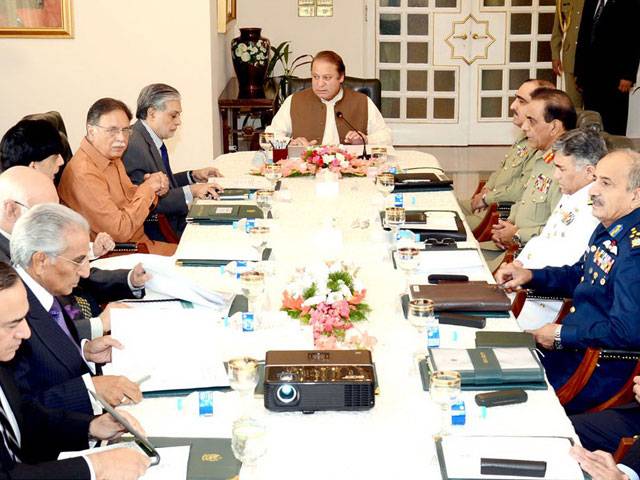ISLAMABAD - The federal government has decided to reconstitute Defence Committee of the Cabinet and rename it as Cabinet Committee on National Security with sole aim to broaden its scope and ambit. This would also end the debate about the revival of dormant National Security Council once and for all, it believes.
The decision was taken in the Defence Committee of the Cabinet (DCC) meeting held here on Thursday under the chair of Prime Minister Nawaz Sharif. The committee also extended conditional dialogue offer to militants provided they would lay down their arms but it kept the option of crushing militancy with use of state force.
The meeting was attended by Interior Minister Ch Nisar Ali Khan, PM’s Adviser on Foreign Affairs Sartaj Aziz, Finance Minister Ishaq Dar, Chairman Joint Chiefs of Staff Committee, and services chiefs. The revival of the dormant National Security Council came under discussion but finally it was decided that the scope of the DCC would be expanded under new nomenclature of Cabinet Committee on National Security (CCNS).
The proposed CCNS would also be chaired by the prime minister and include ministers of foreign affairs, defence, interior and finance, the JCSC chairman and services chiefs as its members. It would focus on the national security agenda with the aim to formulate a national security policy that will become the guiding framework for its subsidiary policies – defence policy, foreign policy, internal security policy and other policies affecting national security.
In the context of regional peace and stability, the DCC deliberated in detail on the evolving situation in Afghanistan. It was emphasized that a peaceful, stable and united Afghanistan was in Pakistan’s vital interest and would contribute positively to peace, security and progress of the region. Pakistan will fully support the international community’s efforts for peace and reconciliation in Afghanistan. Pakistan will also work to comprehensively upgrade its bilateral relations with Afghanistan in all dimensions.
During the DCC meeting, presentations were given by Sartaj Aziz, foreign secretary and military operations director general (DGMO). It also received a briefing on the situation along the Line of Control (LoC) and took note of the continued violations of the ceasefire. Pakistan’s policy of restraint and responsibility was highlighted.
The committee condemned the unprovoked firing in the Shaqma sector, which resulted in the Shahadat of Army Captain Sarfraz, and the members offered fateha for him. It was strongly emphasised that the ceasefire should be maintained in letter and spirit. All military and diplomatic channels should be used to prevent ceasefire violations. It was emphasised that Pakistan will also continue to seek dialogue and resolution of all outstanding issues with India peacefully.
With the reconstitution of the DCC as CCNS, Pakistan Muslim League-Nawaz leadership has finally dumped the dormant National Security Council and it is expected that the debate of its fate would also come to an end. The NSC would however continue to exist on paper until it is formally scraped through an act of parliament because right now it is having the constitutional cover as it was formed through an act of parliament in April 2004.
The brainchild of the then dictator General (r) Pervez Musharraf, the NSC remained functional from 2004 to 2008 and comprised president and prime minister (co-chairman), senate chairman, national assembly speaker, chairman joint chiefs of staff committee, services chiefs, leader of opposition in national assembly and chief ministers of all the four provinces.
But in 2009, the then prime minister Syed Yusuf Raza Gilani had removed its then secretary Mahmud Ali Durrani for giving statements over and above his head on national security and his government then virtually abandoned the NSC. Since then no meeting of the NSC has been called. In Charter of Democracy mainly signed by the two major political players – the Pakistan People’s Party and PML-N – in London in 2006, it was agreed that NSC would be scraped and DCC would be revived and strengthened. Thus on Thursday, the PML-N led government has fulfilled one of the items on CoD agenda.
Friday, April 19, 2024
Govt to convert DCC into broader CCNS
New cabinet committee to ‘kill’ paralysed National Security Council | Led by PM, it will focus on national security agenda, govern auxiliary national policies | DCC reviews LoC, Afghan situation | Raps LoC firing, but vows to continue seeking dialogue with India

8:18 PM | April 19, 2024
Formula 1 returns to China for Round 5
9:05 PM | April 19, 2024
Germany head coach Julian Nagelsmann extends contract till 2026 World Cup
9:00 PM | April 19, 2024
IMF urges Italy, France to spend less, Germany to loosen purse strings
8:57 PM | April 19, 2024
PM calls UAE president, admires Emirati leadership's response to recent Dubai rains
8:55 PM | April 19, 2024
Church leader calls for including Christians in Gandhara Corridor
8:50 PM | April 19, 2024
A Tense Neighbourhood
April 19, 2024
Dubai Underwater
April 19, 2024
X Debate Continues
April 19, 2024
Hepatitis Challenge
April 18, 2024
IMF Predictions
April 18, 2024
Kite tragedy
April 19, 2024
Discipline dilemma
April 19, 2024
Urgent plea
April 19, 2024
Justice denied
April 18, 2024
AI dilemmas unveiled
April 18, 2024
ePaper - Nawaiwaqt
Advertisement
Nawaiwaqt Group | Copyright © 2024





